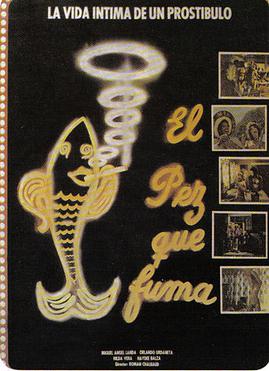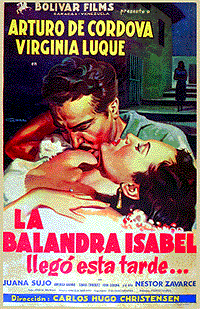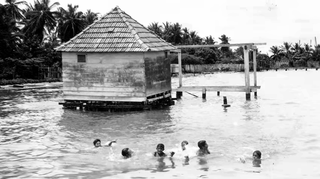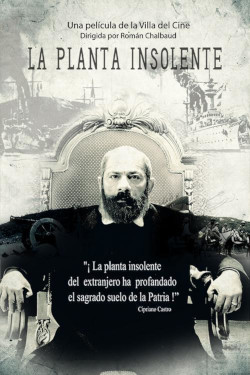
Marcos Evangelista Pérez Jiménez was a Venezuelan military officer and the dictator of Venezuela from 1950 to 1958, ruling as member of the military junta from 1950 to 1952 and as president from 1952 to 1958. He took part in the 1948 Venezuelan coup d'état, becoming part of the ruling junta. He ran in the 1952 election. However, the junta cancelled the election when early results indicated that the opposition was ahead, and declared Jiménez provisional president. He became president in 1953 and instituted a constitution that granted him dictatorial powers.

El Pez que Fuma is a 1977 Venezuelan film directed by Román Chalbaud. The film takes place in La Guaira, in the titular brothel. It is considered by many to represent a high point in Venezuelan cinema, and was made during the Golden Age of Venezuelan cinema.

The Yacht Isabel Arrived This Afternoon is a 1949 Venezuelan-Argentine film directed by Carlos Hugo Christensen. It was shown at the 1951 Cannes Film Festival, where it also won for Best Cinematography.

El Caracazo is 2005 Venezuelan historical film that deals with the events of El Caracazo, the name given to a series of riots and lootings in and around Caracas on 27 February 1989. The film was produced and directed by the veteran Venezuelan filmmaker Román Chalbaud. It is a documentary drama, not only about the titular tragedy but also putting it in historical perspective. The film cost 3 billion bolívares, provided by the Ministry of Culture.

Isla de sal is a 1964 Venezuelan drama comedy film directed by Clemente de la Cerda. It was his first feature film, but was considered one of his more important works. Later he won national acclaim with his blockbuster Soy un delincuente (1976).

The cinema of Venezuela is the production and industry of filmmaking in Venezuela. Venezuelan cinema has been characterised from its outset as propaganda, partially state-controlled and state-funded, commercial cinema. The nation has seen a variety of successful films, which have reaped several international awards. Still, in terms of quality, it is said that though "we can point to specific people who have made great films in Venezuela [and] a couple of great moments in the history of Venezuelan cinema, [...] those have been exceptions". In the 21st century, Venezuelan cinema has seen more independence from the government, but has still been described as recently as 2017 to be at least "influenced" by the state.

Román Chalbaud was a Venezuelan film director, screenwriter, and prominent playwright. Starting work in television after prestigious training, Chalbaud moved into making films before the industry took off in his home country, returning to theatre where he had been a great success for several years until filmmaking became a viable industry. He served as the president of Venezuela's leading theatre, television, and film organisations.

That's the Woman I Want is a 1950 Venezuelan-Argentine comedy film directed by Juan Carlos Thorry and starring Olga Zubarry, Francisco Álvarez, Héctor Monteverde and Amador Bendayán. It was Thorry's directorial debut, though he had gone to Venezuela to act, and was commercially successful. The film has been analyzed as part of Venezuelan film history, in particular by Central University of Venezuela academic María Gabriela Colmenares.
The Centro Nacional Autónomo de Cinematografía (CNAC) is the governing body of the Venezuelan cinema created by the Venezuelan government in 1993. It is responsible for selecting the films which will represent Venezuela in international film awards like the Academy Awards and Goya Awards. It is headquartered in Los Ruices, Caracas.

Manuel Trujillo Durán was a Venezuelan photographer who pioneered film in Venezuela. Trujillo was most successful as a photographer, though he dabbled in other industries and is best remembered for his connections to the fledgling film industry in Venezuela. He became one of the first people from Latin America to learn how to show films; he was thought for many years to be the director of Venezuela's first films, and traveled through Venezuela and Colombia with projectors to introduce cinema to this part of the South American continent.

Cuchillos de fuego is a Venezuelan film released in 1990. It was directed by Román Chalbaud based on his theatre play Todo bicho de uña, where a young man, David, seeks revenge on his mother's rapist and murderer. In the film, which is styled like a Western, a stop-motion animated children's drawing of the young David crying over his mother's body is used to tell parts of the story. After searching through the Andes for ten years, he kills several Apaches for his revenge.

Un célebre especialista sacando muelas en el gran Hotel Europa was the first Venezuelan film. It was screened at the Baralt Theatre in Maracaibo, Zulia on 28 January 1897 as the second in a film block of four; the block also featured another film from Maracaibo. Little is known about the film's production, and scholars are uncertain of the identity of its director.

Muchachos bañándose en la laguna de Maracaibo is the second Venezuelan film produced, after Un célebre especialista sacando muelas en el gran Hotel Europa. It was screened at the Baralt Theatre in Maracaibo, Venezuela, on 28 January 1897.

Carlos Ruiz Chapellín was a Venezuelan showman, filmmaker and performer. He is remembered for creating slapstick comedy films in the late 19th century.
Una paliza en el estado Sarría is a Venezuelan slapstick comedy film created by and starring Carlos Ruiz Chapellín and Ricardo Rouffet. It was first played in the Circo Metropolitano de Caracas on 26 November 1897.
Venezuela was introduced to cinema as a for-profit industry in the 1890s, when the medium became international. There were at least eight national films made in the decade, by three groups of filmmakers — one of the groups was based in Maracaibo and one was based in Caracas. The first film screening in the nation may have taken place as early as 1894, but is generally reported as 1896, with this later date being the first scheduled public screening.
Venezuela had been introduced to cinema in the 1890s. After an initial boom in screenings and production, the presence of cinema in the nation was lower between 1900 and 1910.
SOMOS Films LLC is a Miami based company that produces feature films in Spanish for theatrical wide release, television, internet and other distribution means. SOMOS Films is part of the SOMOS Group(SOMOSTV, SOMOS Productions, SOMOS Distribution, SOMOS Next, SOMOS Fast and SOMOS Films). SOMOS Films produces its own projects and participates in co-production with international partnering companies. In its coproduction projects the company works with local talent at creative, technical and artistic levels.

La planta insolente is a 2017 Venezuelan film directed by Román Chalbaud. The film depicts the tenure of Venezuelan President Cipriano Castro. It was a box-office flop and received generally negative reviews from critics.














